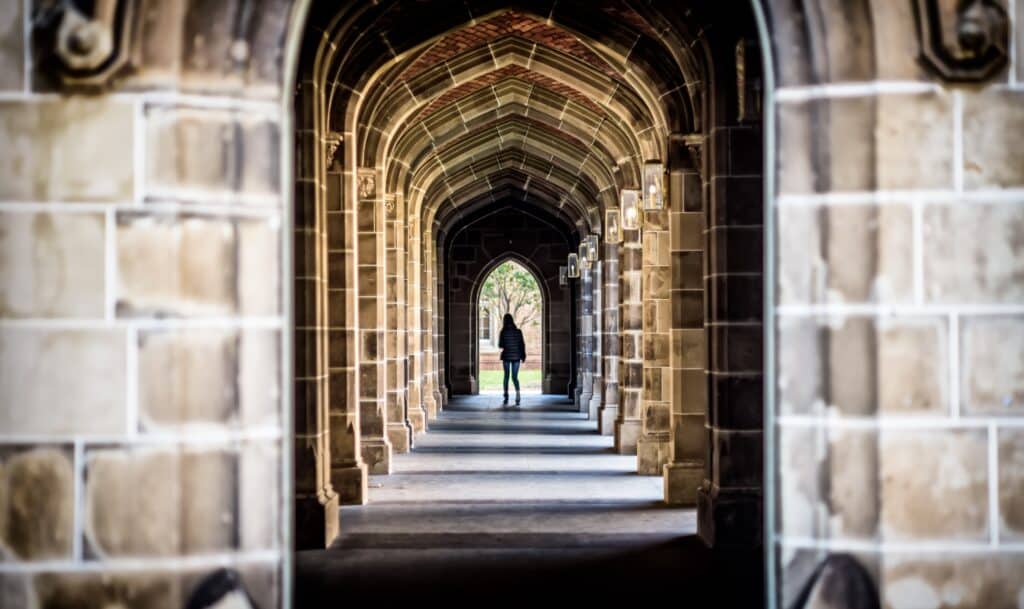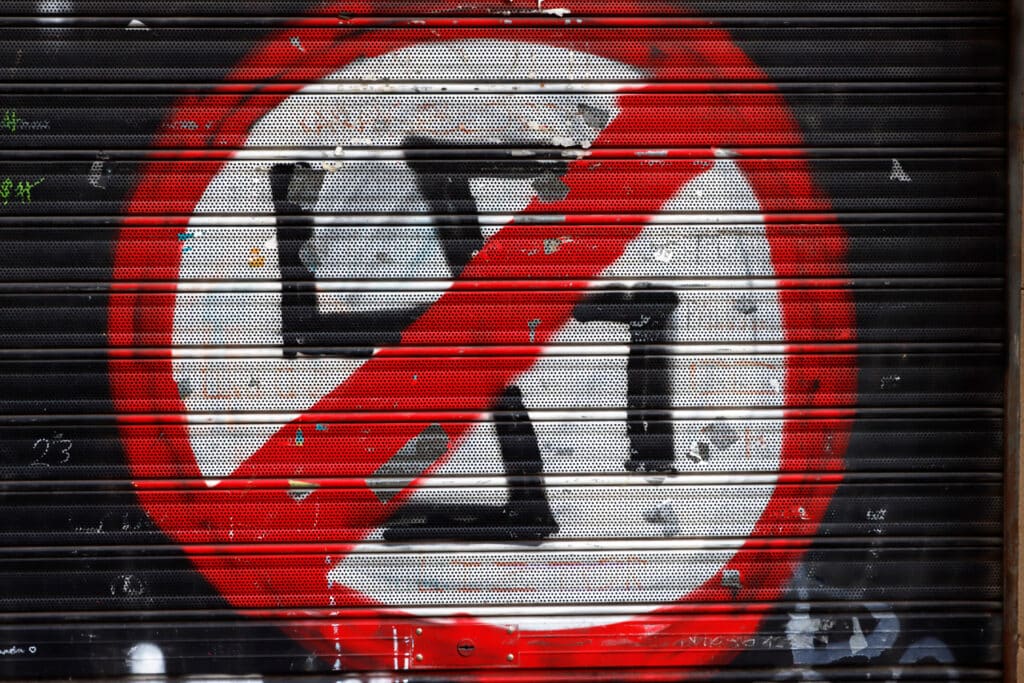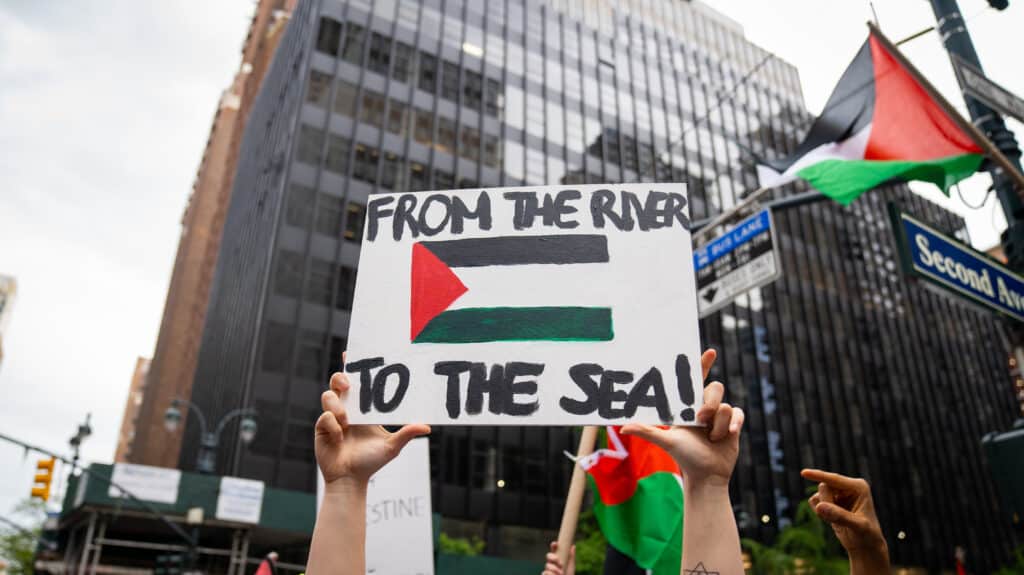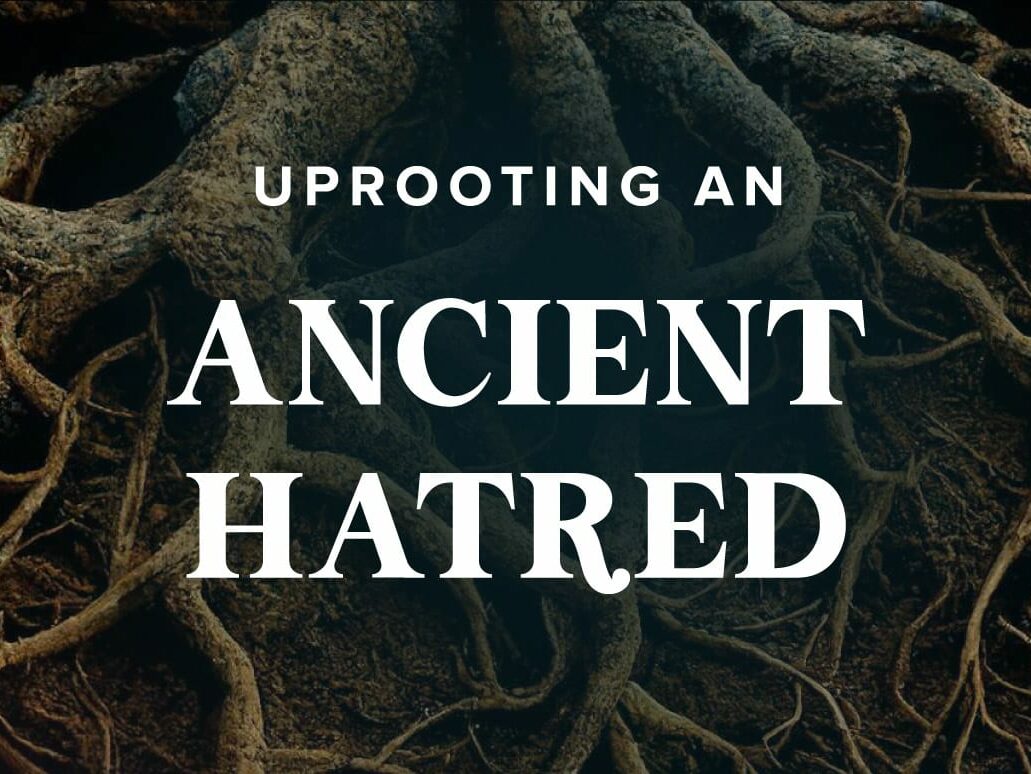Over the past month, the so-called anti-Zionist protests around the world quickly turned antisemitic. That is why we must ask ourselves a very important question: is there a difference between the two terms? And what is anti-Zionism?
What is anti-Zionism? What is antisemitism?
In simplest terms, anti-Zionism is a political stance or ideology that opposes the existence or principles of Zionism. And what is Zionism? It is a movement that advocates for the establishment and support of a Jewish state in the historic region of Israel.
Antisemitism, in turn, is the hatred towards a specific religious, ethnic and cultural group: the Jews. We’ve seen it expressed loud and clear for centuries. Hatred of the Jewish people has led to religious discrimination, racial prejudice, and even social hostility, murder and genocide.
Pro-Palestinian circles continue to claim that they are anti-Zionist, because they oppose the actions of the Israeli government. So, they are not antisemitic. However, when Jewish people who are nowhere near Israel continue to get harmed or even killed, this rhetoric is less and less believable.
Is Anti-Zionism the Same as Antisemitism?
Many would like us to believe that these closely-related terms represent, in fact, very different concepts. While antisemitism is a form of prejudice or even hostility against the Jewish people, anti-Zionism – as some say – is just political and relates to the state of Israel and its policies.
But after brutal encounters on multiple university campuses during anti-Israel protests, Jewish students were advised to attend their classes virtually.
Around that same time, an anonymous message was shared on Cornell message board, “If you see a Jewish ‘person’ on campus follow them home and slit their throats.” (WP)
So, if anti-Zionism is aimed at Israel, why are Jewish people around the world fearing for their lives?
The Beginning of Anti-Zionism
Anti-Zionism is a much younger term than antisemitism. In fact, it first started appearing at the end of the 19th and beginning of the 20th century, when plans for a potential Jewish state began to take shape. And unsurprisingly, not everyone was in favor of this idea.
Theodore Herzl was the father of modern Zionism, but his political vision of the Jewish state had its opponents. Nevertheless, this “original” anti-Zionism was a far cry from what it is today.
Asher Zvi Hirsch Ginsberg, a Jewish thinker and essayist, later known by his alias, Ahad Ha’am, did not agree with political Zionism. He argued against Herzl’s focus on a political state as the primary solution for the Jewish people. Instead, Ahad Ha’am advocated for a cultural and spiritual center for the Jewish people in the Holy Land.
If you paused for a moment over the words “in the Holy Land,” that’s great! Ahad Ha’am’s “anti-Zionism” did not oppose the Jewish presence in the land we know today as Israel. On the contrary! He also wanted to see the Jewish people thrive in their ancestral homeland. But he wanted, first and foremost, to see their religious lives, their culture and their family lives to thrive.
Ahad Ha’am was not opposed to the existence of a Jewish homeland. He simply did not see eye to eye with Theodore Herzl. Although many label Ahad Ha’am as one of the first “anti-Zionists”, none of his views or writings could match the anti-Zionism we see today.
Which Zionism is the World “Anti?”
While anti-Zionism is a modern concept, Zionism itself goes back all the way to Biblical times. A great example of it can be found in the Book of Nehemiah, and also, for example, in Psalm 137:
“By the rivers of Babylon we sat and wept when we remembered Zion… If I forget you, Jerusalem, may my right hand forget its skill. May my tongue cling to the roof of my mouth if I do not remember you, if I do not consider Jerusalem my highest joy.” (Ps 137:1,5-6)
Nehemiah pioneered the return of the Jewish people from Babylonian exile to their Promised Land. In doing so, the people lived out the purest form of Zionism. They longed for their everlasting capital, Zion, where they could once again establish their home.
Zionism was a movement for self-determination.
Since the days of the prophets, in the hearts of the Jewish people, not much has changed. When the early Zionist pioneers arrived in HaAretz – “THE Land” – they didn’t carry guns but tools. They were ready to cultivate the land, grow crops, and herd animals. They wanted to see a true, physical revival in Zion.
After the UN determined in 1975 that “Zionism was a form of racism and racial discrimination” (without explaining how), the resolution was revoked in 1991. Nevertheless, the damage was already done, and the Zionist movement has been considered controversial ever since.
Is Anti-Zionism Political or is it… Spiritual?
If this is about the policies of the Israeli government and the actions of the Israeli military, why was a young Jewish woman brutally stabbed at her apartment in France?
Why are Jewish people in the diaspora targeted in the name of anti-Zionism?
These are questions that we must not ignore.
And finally, we must look at these attitudes from a spiritual perspective. Can one call for an annihilation of the Jewish state while trying to convince others they don’t wish harm on the Jewish people?
When anti-Zionists deny Israel’s right to exist, question Jewish self-determination, and employ antisemitic tropes and stereotypes… Maybe their anti-Zionism is more antisemitic than they are aware of or willing to admit.
The truth of the matter is, there is a very dark heart behind these stances that opposes the heart of God. “…for he who touches you, touches the apple of His eye,” Zechariah wrote of Israel who belongs to the Lord of Hosts (Zech. 2:8).
Antisemitism: the Jew-hatred we See Today
Antisemitism has a long and troubling history. It has been a recurring problem even throughout church history, with major and tragic consequences. Yes, antisemitism led to the Holocaust during World War II.
Many countries and international organizations have taken steps to combat antisemitism and promote religious and ethnic tolerance as a result of these events. However, it didn’t take long for antisemitism to rise again, especially after the creation of the Jewish state and its unprecedented success.
To avoid criticism, many antisemites started masking their disdain of Israel’s success with a very flawed facade – namely, anti-Zionism. “We don’t hate the Jews – we just disapprove of Israel.” In other words, we don’t hate the Jews, we just don’t like their independence. We don’t hate them, we just don’t like how they live.
And, probably most importantly, “we don’t hate the Jews, we just don’t like that they are free and prosperous”.
The True Face of Anti-Zionism
Anthony Julius, a British advocate, wrote that while there is a distinction between anti-Zionism and antisemitism, anti-Zionists cross the line so often that they make the distinction meaningless (Trials of the Diaspora: A History of Anti-Semitism in England, 2010).
People who identify as anti-Zionist often explain that they do so for political, humanitarian, or human rights reasons. But, as Julius also observed, they tend to also split the Jewish people into two categories. The “good” Jews oppose Zionism and often Israel itself, meanwhile the “bad” Jews support it. (Yes, there are even anti-Zionist Jews, but that’s a topic for another day.)
These anti-Zionists seem to be oblivious that separating Jews into a “good” and “bad” category is pure antisemitism. It is the classic idea of “Jews are okay if they support my views, but since most of them don’t, they are wrong”.
And so, a protester in Europe may state that they simply oppose the treatment of Palestinian populations in Israel, and in the next second raise a banner with a drawing of the Star of David – a symbol of all Jewish people – in a trash bin. In other words, they are targeting all Jews by superficially standing against the Jewish state. And to be clear, approx. 7 million Jews live in Israel, while over 8 million live in the diaspora.
What is scary, however, is that the line between anti-Zionism and antisemitism has become so blurred, many people seem to be no longer bothered by the manifestation of either.
The Present Rise of Jew-hatred Worldwide
As of the end of October in the United States, there has been nearly a 400% rise in antisemitic acts since October 7th (Oct 30, 2023. PBS). An elderly Jewish man died after a violent encounter with a pro-Palestinian protester in California.
In Europe, a young woman in France was killed in her home after her building was marked with Jewish symbols. In Russia, hundreds charged through an airport, looking to harm Jewish people who just landed on a plane from Tel Aviv. With antisemitic slogans and scary threats, they caused the airport to shut down for more than 24 hours.
Also in Australia, protests have called for the extermination of the Jewish people. The aggressive expression of this so-called “anti-Zionism-turned-antisemitism” has shaken the entire world.
“From the river to the sea Palestine will be free”
Many think that the chant “From the river to the sea Palestine will be free” is a call for peace and freedom for all. But it is important to realize that a Palestine “from the river to the sea” would equal wiping Israel off the map. This territorial aspiration desires a state that is Jew-free.
Thus, the phrase “from the river to the sea” should never be taken lightly or dismissed. It does not call for a peaceful cohabitation but for an actual genocide, not unlike the Holocaust.
World Reacts to Anti-Zionism and Antisemitism
While in the immediate aftermath of the October 7th attack sympathy towards Israel was expressed by many nations and people, the narrative shifted very quickly to one of condemnation. Many Jews but also Christians became concerned.
In the coming weeks, numerous pro-Palestinian protests took over the streets of world capitals. While some focused on calling for a ceasefire, a staggering number of protesters turned to antisemitic profanities, hate speech and even violence at the rallies. Like Julius previously observed, the line between anti-Zionism and antisemitism became meaningless.
The governments, civil society, and individuals have a role to play in combating antisemitism and ensuring the safety and security of Jewish communities. And in the middle of November, hundreds of thousands of Americans took action to show solidarity with the Jewish people.
“Demonstrators from across the United States gathered on Tuesday on the National Mall in Washington in a vast show of solidarity with Israel,” the New York Times reported on November 14. But more than that, the rally speakers addressed the rising antisemitism and encouraged listeners to not remain silent in the face of evil.
What You Can Do as a Christian
It’s important to address and counteract antisemitism through education, awareness, and even legal measures. Promote understanding among other religious and ethnic groups. We need to act before it escalates and gets – again – out of control.
“Antisemitism doesn’t need a reason, only an opportunity” – a Holocaust survivor painstakingly pointed out in a video interview for @seven10stories. (The Instagram profile was set up to record testimonies of survivors of the October 7 massacre in Israel.)
This poignant quote is a good reminder that one cannot reason with antisemitism. Instead, we need to uproot it and oppose it as soon as we notice any sign of it. As Christians, we have the God-given duty to expose evil (Eph 5:11).
Today is a good day to begin and stand with our Jewish brothers and sisters who are once again being persecuted. They are the apple of God’s eye, and as Christians, we love what He loves.
Bring hope and healing to people hurting in Israel: https://firmisrael.org/hope/
Pray for the Hostages by Name until they return safely: https://firmisrael.org/praybyname/
Join our Hope & Healing – Show Up and Serve Tour: https://firmisrael.org/serve-tour/
Uprooting an Ancient Hatred: What You Need to Know about Antisemitism – Free Video + PDF Guide Mini-series
What do you need to know about antisemitism? Find out in this unique 4-part mini-series that our education department developed especially for you.
- What is antisemitism? Why the rise in Jew-hatred today?
- History of antisemitism: Is this a part of Christianity?
- Antisemitism today
- How the Church can fight antisemitism
Articles Related to Anti-Zionism: What is its Connection to Antisemitism?
- 3 Ways to Confront Christian Anti-Zionism
- The History of Antisemitism in the Church
- Israel and the Church: God’s Plan for His People
- Antisemitism: Why are Jews Persecuted?
- FIRM CEO Responds to Viral Video of Hebrew Worship Concert Protest
Estimated reading time: 9 minutes



